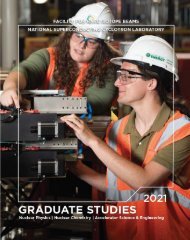202 FRIB Graduate Brochure
You also want an ePaper? Increase the reach of your titles
YUMPU automatically turns print PDFs into web optimized ePapers that Google loves.
Admissions and<br />
degree process<br />
We are committed to providing the highest quality graduate education in nuclear science,<br />
nuclear astrophysics, accelerator physics and related instrumentation technologies. Our<br />
process is part of MSU’s top-ranked nuclear physics graduate program. Apply today to<br />
accelerate your journey to a rewarding career.<br />
1. Apply<br />
The degree requirements and curricula differ, depending<br />
on whether you are in the Department of Chemistry,<br />
Department of Physics and Astronomy, or the College<br />
of Engineering. We refer you to the corresponding<br />
departments for application procedures and admission,<br />
course, and degree requirements.<br />
5. Complete your program, advance to a<br />
rewarding career<br />
After you advance to PhD candidacy, it usually takes two<br />
to four years to complete the original research that forms<br />
the basis for your dissertation.<br />
2. Individualized curriculum<br />
Based on your background, the graduate advisors in each<br />
department will put together an individual curriculum<br />
for you. Students accepted into the graduate program<br />
at <strong>FRIB</strong> receive teaching or research assistantships. At<br />
<strong>FRIB</strong>, your first contact point is the Associate Director<br />
(AD) for Education, who will discuss with you the various<br />
options and opportunities for research topics. The AD for<br />
Education will continue to serve as contact between you,<br />
<strong>FRIB</strong>, and your respective department for the duration of<br />
your thesis studies.<br />
3. Research toward thesis<br />
<strong>Graduate</strong> students at <strong>FRIB</strong> will perform their research<br />
under the guidance of a faculty member. Faculty can<br />
serve as the direct thesis supervisor, as they have either<br />
joint or adjunct appointments at one of the departments.<br />
The research environment at <strong>FRIB</strong> is collaborative, and<br />
the connection between individual research groups is<br />
strong. For example, within a collaboration a professor in<br />
the Department of Physics and Astronomy can supervise<br />
a chemistry student and vice versa. After you choose your<br />
area of research, you will form your guidance committee,<br />
which will meet with you at least once a year to ensure<br />
satisfactory progress towards your degree.<br />
4. Put in the work<br />
All graduate students actively participate in research<br />
discussion, nuclear seminars, departmental colloquia<br />
and the daily laboratory business. Essential to a doctoral<br />
degree is that you develop and then demonstrate the<br />
ability to conduct vital, independent research. To become<br />
an independent researcher, you will need to develop a set<br />
of proficiencies.<br />
A graduate student reads over results at a poster session.<br />
QUESTIONS?<br />
CONTACT <strong>FRIB</strong> EDUCATION:<br />
Heiko Hergert, Associate Director for Education,<br />
gradschool@frib.msu.edu<br />
Tabitha Pinckney, Educational Program Coordinator,<br />
pinckney@frib.msu.edu<br />
30<br />
<strong>202</strong>2_<strong>FRIB</strong>_<strong>Graduate</strong>_<strong>Brochure</strong>v4.indd 30<br />
10/29/<strong>202</strong>1 3:33:44 PM






